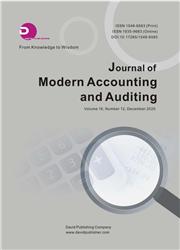Earnings Management in State-Owned Enterprises in a Period of Macroeconomic Instability
引用次数: 0
Abstract
The purpose of this paper is to examine whether and to what extend Greek state-owned enterprises engage in earnings management techniques during 2012-2016. Most prior studies on earnings management have used data from large economies with relative stable macroeconomic contexts (e.g., USA). Our knowledge about earnings management in smaller economies is rather limited. To fill this void, we conducted our study in Greece and focused on the abovementioned period, which is very interesting given that Greece experienced a substantial political and macroeconomic instability (e.g., four elections, one referendum, capital controls, and two memorandums). Two different models (i.e., The Earnings Distribution Model and the Modified Jones Model) are used to provide answers to the research questions. The sample is composed of 50 state-owned enterprises. The results show that Greek state-owned enterprises did not adopt any earnings management techniques during the examined period. These results are rather robust given that they come from two different models. According to the literature, macroeconomic and political instability provide incentives to managers to use earnings management techniques. Interestingly though, our results suggest that this is not the case for a smaller economy. The findings of this study will allow investors, auditors, and users of the financial statements to make better decisions when studying companies that are experiencing those difficulties. The adoption of two different methods and the similar results is an indication of more robust and valid findings.宏观经济不稳定时期的国有企业盈余管理
本文的目的是考察希腊国有企业在2012-2016年期间是否以及在多大程度上参与盈余管理技术。大多数先前关于盈余管理的研究都使用了宏观经济环境相对稳定的大型经济体(如美国)的数据。我们对小型经济体盈余管理的了解相当有限。为了填补这一空白,我们在希腊进行了研究,重点关注了上述时期,鉴于希腊经历了严重的政治和宏观经济不稳定(例如,四次选举、一次公投、资本管制和两份备忘录),这一时期非常有趣。采用两种不同的模型(即收益分配模型和修正琼斯模型)来回答研究问题。样本由50家国有企业组成。结果表明,希腊国有企业在审查期间没有采用任何盈余管理技术。这些结果是相当稳健的,因为它们来自两个不同的模型。根据文献,宏观经济和政治不稳定激励管理者使用盈余管理技术。有趣的是,我们的研究结果表明,规模较小的经济体并非如此。这项研究的结果将使投资者、审计师和财务报表用户在研究遇到这些困难的公司时能够做出更好的决策。采用两种不同的方法和相似的结果表明了更有力和有效的发现。
本文章由计算机程序翻译,如有差异,请以英文原文为准。
求助全文
约1分钟内获得全文
求助全文

 求助内容:
求助内容: 应助结果提醒方式:
应助结果提醒方式:


